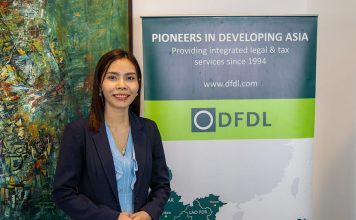
Thida Ann is the Senior Associate Director at CBRE Cambodia. We sit down for an interview with the young, smiley and eloquent real estate professional and discuss, among other issues, the keys to her success—and CBRE’s—inside Cambodia’s booming property market.
B2B: You have been very successful, reaching a high position within an international company. What are the keys to your success?
Thida: Commitment, integrity and confidence are the main attributes that have brought me to this point. Early on in your career it is important to choose to work for a company that will allow you to grow and develop your skills. This is more important than simply looking at the package offered by your prospective employer. Your opportunities for progression are vital and are what will give you a strong platform for personal development.
Early on I wasn’t afraid to take on new responsibilities; it can be scary taking on tasks you are not familiar with but you should view them as a learning opportunity.Also, it is important to be passionate about what you do; I love my job and that really helps keep me focused. If you don’t enjoy what you do it will be difficult to be dedicated 100%.
B2B: In Cambodia, what is the place of women in the real estate sector?
Thida: Previously there was a divide with more roles occupied by male professionals. This trend is changing, with women taking advantage of improved education and training opportunities and having aspirations to have their own successful career. This is a great development for the marketplace as it increases competition for jobs and makes a deeper talent pool in the sector; now management positions are filled according to skill and expertise rather than just gender.
B2B: What challenges have you faced as a female professional making a career in the property sector?
Thida: Our profession is always challenging and that is what makes it an exciting sector to work in. Some of the things I have found difficult include working long hours, particularly during travel, when I am away from my family and I miss home. Cambodia historically lacks transparency, and one of our biggest challenges is advising international clients on the difficulties of working in a market where data is not as freely available as in more established and transparent markets.
B2B: What are the keys to CBRE success in Cambodia?
Thida: We always keep our client as the number one priority: their problem is our problem, and their success is our success. We focus on quality of service to build long lasting relationships with our clients. Our resources are important and as a service company our biggest resource is our people. From recruitment, we offer our team a good working environment and make them feel CBRE is their second home. As a company we link our goals with those of our team and this leads to a strong teamwork culture: we share our achievements and successes.
B2B: What are some of the trends you are seeing for the property sector, and what lies in store for the future?
Thida: Cambodia’s economy is experiencing strong growth with an average GDP increase of 7% a year. In the real estate market, this has translated to increased demand across all sectors, and a solid surge in foreign investment. International companies are bringing their expertise to the market leading to improved market practices and expertise. Despite the booming market each sector still has risks and investors and developers should understand the market and do thorough research prior to investment. Projects that succeed will do so because they offer the right product in strong locations with reasonable pricing.
B2B: Can you describe the current commercial property in Phnom Penh and any new developments?
Thida: The market has seen a transition from traditional, local-quality developments to modern practices and international standards. When I first joined CBRE there was only one commercial highrise building, Canadia Tower, which launched in 2009. This was followed by Phnom Penh Tower and Vattanac Capital, and now we are seeing an increasingly developed skyline across the city. Occupiers are now realizing the benefits of moving to purpose-built commercial space where there is greater efficiency, security and facilities compared to traditional shophouses or villas. Retail is also seeing changes with Aeon launching the first international shopping centre. Consumer’s preferences are changing and traditional lower grade shopping centres are becoming less popular. Although the saying “location, location, location” remains relevant, centres also need to match their tenant mix, pricing, design and management to maximise footfall.








